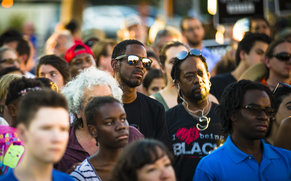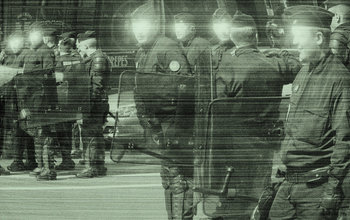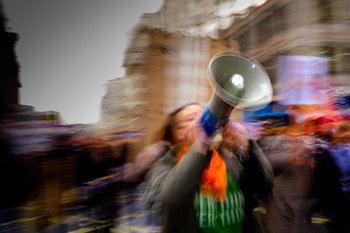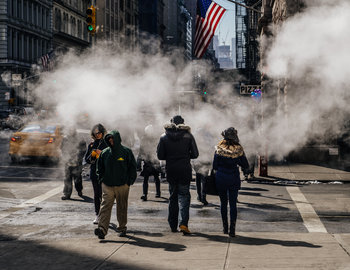Right to Life
The right to live and be free from harm.Right to Liberty
The right to conduct your life as you see fit. An extremely broad inalienable right found in the United States Declaration of Independence with the phrase "Life, Liberty and the pursuit of Happiness."Right to Human Dignity
The right of a person to be valued and respected and to be treated ethically.Integrity of the Person
Sovereignty over one's own body. For example, the right to informed consent for medical procedures.Freedom of Movement
The right to go outside and enjoy public space, to travel within a nation and to live where you want. Includes the right to leave your country and return.Freedom of Conscience & Religion
The right to live according to a religion or set of morals in worship, teaching, practice and observance.Freedom of Thought
The freedom to think what you think.Freedom of Speech
The freedom to express ideas that others may find objectionable or inconvenient.Freedom of the Press
The right to publish information to the world using media without being censored.Right to Privacy
The right to live aspects of your life unobserved and unrecorded.Equality Before the Law
The principle that the same laws apply equally to all.Freedom of Peaceful Assembly
The right to assemble as groups. For example, the right to hold a peaceful political protest.Freedom of Association
The freedom to know and interact with others at will including the right to freely leave a group or relationship.Right to Organize
The right of employees to organize and bargain collectively with their employers.Right to Vote
The right to vote for a democratically elected government.Right to Run for Public Office
The right to run in a democratic election.Property Rights
The right to own value that you have created or legally purchased from another including intangible property such as a patent.Economic Rights
The right to pursue a profession and business of your choosing and to conduct trade.Right of Self-defense
The right to take reasonable steps to defend yourself from imminent harm.Due Process of Law
The principle that rights and freedoms will not be denied without legal procedures that guarantee fundamental fairness, justice and liberty.Freedom from Unreasonable Search or Seizure
The right not to be searched or to have your property seized.Right Not to be Arbitrarily Detained or Imprisoned
The right not to be detained or imprisoned without due process of law.Presumption of Innocence
The principle that the burden of proof is on the state in any matters against an individual.Right of Defence
A series of rights that apply to defending yourself from any accusations against you under the rule of law. For example, the right to be promptly informed of the charges against you and the right to be tried within a reasonable time.Right to Petition
The right to lodge complaints against the government and to seek their assistance without fear of reprisal. For example, the right to lodge an official complaint regarding the professional conduct of any employee of the government and to have this complaint evaluated and actioned by an independent body.Freedom of Information
The right to a transparent and open government that shares information about its activities and data that it has collected with the public subject to constraints such as privacy rights.Right to Marriage
The right to form a partnership of marriage with another person as you both choose.Parental Rights
The right to raise your own children.Right to Education
The right to receive a free education.Right to Health
The right to food, clothing, housing and medical care and necessary social services.Right to Culture
The right to freely to participate in the cultural life of a community. For example, the right of a community to speak a language and to pursue traditions that may be very different from the mainstream culture of a nation.Rights of the Child
Children have many of the same rights as adults such as freedom of speech. Other rights are specific to children such as the right to play. Many of these rights are highly specific such as a right to reading materials. Others are general such as the principle that the best interests of the child be prioritized in any matters that concern them, such as a divorce.Inalienable Right
An inalienable right, also known as a natural right or unalienable right, is a right that can't be bought, sold or otherwise transferred. These rights also can't be constrained by laws and regulations except to prevent violation of other inalienable rights. For example, the right to play of a child is an inalienable right that can't be arbitrarily taken away.Legal Rights
Legal rights are rights that can be modified by laws. In principle, these can be bought, sold, transferred or limited by government. For example, property rights are a legal right that can be sold. Property rights also commonly have limits such as the time limit on intellectual property rights.Freedom vs Right
A freedom is a right to be left alone to follow your own freewill. A right is a broader term that includes both freedoms and entitlements. An entitlement is something that a society is obligated to give individuals such as an education.Notes
The list above is not exhaustive. Likewise, not every society grants all the rights listed above.Generally speaking, rights and freedoms get stronger with each century that passes as new challenges emerge in protecting rights. For example, privacy rights are likely to get stronger in response to the proliferation of technologies that can be used to observe people and record, transmit, share and use this data. Sustainability and a right to a healthy environment is another area where rights may be expanded in future to handle technological change and risks to quality of life.| Overview: Rights | ||
Type | ||
Definition | Freedoms and entitlements that are guaranteed by a society. | |
Related Concepts | ||




































